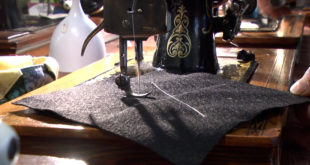It’s opening day of the Firearms Deer Season in Michigan and the best way to ensure a good hunt is to come home safely.
The Michigan Department of Natural Resources has a list of safety tips ranging from gun safety to making sure you don’t get lost in the woods.
DNR Area Law Supervisor Sgt. Grant Emery says safety begins with wearing the proper clothing.
Emery said, “A hunter, when they’re afield in the process of hunting, have to have a hat, cap, vest or raingear of hunter’s orange, at least 50 percent of it has to be that, and one that we run into many times that I always stress is that even if you are in your blind, you have to have your orange on, because what does happen at times is a hunter shoots at a deer, hits it, the deer runs off, the hunter immediately leaves the blind and goes after it and sometimes does not have their orange on.”
The option of using hunter’s pink instead of orange had been under consideration, but Sgt. Emery said the National Resources Commission decided earlier this year to stick with the orange only.
Also, hunters should always provide a plan to someone before they head out.
Emery said, “And this plan would consist of where you’re going, what time you should be back and to check in with that person when you leave or when you get back so they know, so we don’t have someone out there stranded for hours or overnight or days.”
Here are additional tips from the DNR:
DNR conservation officers provide tips for a safe, enjoyable hunting season
As the Nov. 15 firearm deer season opener nears, Michigan Department of Natural Resources conservation officers encourage hunters to brush up on safety tips and hunting regulations to ensure a safe, enjoyable experience.
“Firearm deer season is a special time of year in Michigan,” Cpl. Dave Painter said. “It brings family and friends together in celebration of our state’s great outdoor heritage. Staying safe, knowing the laws and being good stewards of our resources will help hunters have a memorable outing.”
together in celebration of our state’s great outdoor heritage. Staying safe, knowing the laws and being good stewards of our resources will help hunters have a memorable outing.”
Painter reminds hunters that a mandatory deer check is in place within certain areas of the state due to the confirmation ofchronic wasting disease, a fatal neurological disease found in deer, elk and moose. Hunters harvesting a deer in these CWD areas must bring it to a DNR check station within 72 hours. Visit mi.gov/deercheck for a map and list of check stations.
Regardless of where deer are harvested in Michigan, the DNR encourages all hunters to voluntarily take them to the nearest check station to help with disease surveillance. In addition, big-game hunters who travel outside of Michigan should be aware of new regulations restricting the importation of harvested cervids.
Painter also offered the following general safety tips:
- Treat every firearm as if it is loaded.
- Keep your finger away from the trigger and outside the trigger guard until you are ready to fire.
- Keep the safety on until you are ready to fire.
- Always point the muzzle in a safe direction.
- Be certain of your target, and what’s beyond it, before firing.
- Know the identifying features of the game you hunt.
- Make sure you have an adequate backstop. Don’t shoot at a flat, hard surface or water.
- Unload the firearm before running, climbing a fence or tree, or jumping a ditch.
- Wear a safety harness when hunting from an elevated platform. Use a haul line to bring the unloaded firearm up and down the raised platform.
- Avoid alcoholic beverages or behavior-altering medicines or drugs before or during a hunt.
- Always wear a hat, cap, vest or jacket of hunter orange, visible from all sides, during daylight hunting hours, even if hunting on private land. The law also applies to archery hunters during firearm season.
- Make sure at least 50 percent of any camouflage pattern being worn is in hunter orange.
- Always let someone know where you are hunting and when you plan to return. This information helps conservation officers and others locate you if you become injured or lost.
- Carry a cell phone into the woods. Not only does it let you call for help if necessary, but newer phones emit a signal that can help rescuers locate you. Also consider downloading a compass or flashlight app.
- Program the DNR’s Report All Poaching (RAP) line (800-292-7800) in your phone contacts so you can alert conservation officers to any natural resources violations you may witness.
“These are simple, common-sense tips that can help prevent accidents and save lives,” Painter said. “The DNR encourages all hunters to review the Michigan Hunting and Trapping Digest for other essential information before taking to the field.”
Michigan conservation officers are elite, highly trained professionals who serve in every corner of the state. They are fully commissioned peace offers with authority to enforce the state’s criminal laws. Learn more atwww.michigan.gov/conservationofficers.
 Keweenaw Report Your Source for Local News and Sports
Keweenaw Report Your Source for Local News and Sports





